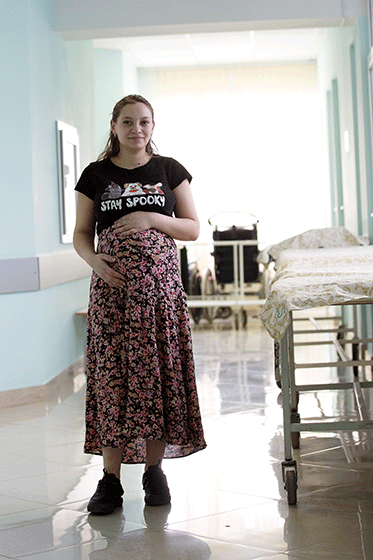News
A 12-hour walk at 7 months pregnant: Escape from the horrors of war in Ukraine
- 18 March 2022
News
CHIŞINĂU, Republic of Moldova – “Nobody cared that I was pregnant and tugging my daughter along. I can’t be angry at those who didn’t stop for us though. Most of the cars were full. There were also older people and people in wheelchairs trying to reach the border on their own.”
Amid the violence, fear and deepening uncertainty that followed Russia’s invasion of Ukraine, 21-year-old Natasha Kuznetsova fled her home in the country’s second-largest city of Kharkiv. The place she described as “the prettiest city in the world” has seen destruction on a devastating scale, with casualties rising by the day and thousands rendered homeless.
“We were determined to stay in our home. But when it became clear that the shelling wasn’t going to stop, we left,” Ms. Kuznetsova told UNFPA. So, at seven months pregnant, she walked for 12 hours with her three-year-old daughter, her mother and her three sisters to cross the border of the Republic of Moldova.
The trip was gruelling; the women endured freezing temperatures, fatigue and fever. The men in the family weren't allowed to leave Ukraine, so the family was split up at the Palanca border crossing. When the women eventually reached Chişinău, they found refuge in a converted sports facility – one of the largest government-operated placement centres that have been set up across the country and where UNFPA is helping to support refugee women and girls as they arrive, tired and traumatised. “We were each given a folding bed. There were hundreds of people trying to get just a little bit of rest before resuming their trip elsewhere. I fell asleep almost immediately.”
Vulnerable lives at risk as health structures are destroyed
But Ms. Kuznetsova's rest was short-lived, as she woke up in the night with a high fever and in pain. An ambulance was called and she was rushed to hospital with an acute kidney infection – which can be life-threatening if not treated urgently. Thankfully, medical staff were able to save both her life and her pregnancy; her health care costs were fully covered by the Moldovan Government and she is recovering well in hospital.
While there, UNFPA staff visited her and provided a dignity kit containing soap, sanitary pads and basic essentials, which are given to women and girls to help them maintain their hygiene and self-esteem during a crisis. Since the start of the war, UNFPA has so far distributed over 6,000 such kits to refugees from Ukraine in the Republic of Moldova.
In the weeks since Russia invaded Ukraine, women have been forced to give birth underground, in bunkers and in metro stations, with newborns cared for in makeshift bomb shelters as health facilities are destroyed. There have been more than 4,300 births in Ukraine since war broke out on February 24th, and 80,000 Ukrainian women are due to deliver in the next three months – many without access to critical maternal health care.
The health care system in Ukraine is buckling under the strain of the Russian onslaught, with dozens of direct attacks against health centres, including maternity hospitals. On March 16th the largest hospital in the besieged southern city of Mariupol was under attack, with some 400 staff and patients reportedly being held hostage overnight.

A search for safety, fraught with danger
According to the United Nations Refugee Agency, the Republic of Moldova is currently hosting the largest number of refugees per population: As of 16 March, over 340,000 people have entered or transited from Ukraine since the start of the war. More than 3 million people are so far estimated to have left Ukraine, many to neighbouring Hungary, Poland, Romania and Slovakia – which are in turn struggling to cope with such sudden and mass arrivals.
The majority of those fleeing are women with children, who are more vulnerable to trafficking and gender-based violence – already a longstanding threat for millions of women and girls in Ukraine. The current crisis and soaring displacement are only putting them at increased risk of abuse, with reports of sexual harassment and violence already mounting.
UNFPA remains on the ground in Ukraine as well as in countries that are hosting refugees, and is preparing to increase operational capacity to deliver more life-saving sexual and reproductive health services and supplies. UNFPA is also deploying mobile health teams to hard-to-reach areas, and providing guidance and support for women and girls to prevent and respond to gender-based violence and abuse as they seek safe havens elsewhere.
The birth of hope amid despair
While she recovers in hospital, just weeks away from giving birth, Ms. Kuznetsova is overcome with emotion about bringing her baby into this new, uncertain reality, and worried her current health issues might affect the well-being of her child.
“Many of our family and friends remained in Kharkiv. If things calm down, we will go back, if not… we will either stay here or move elsewhere, find jobs and raise our children in safety,” Natasha said. “Like any mother, I want to have healthy children, but I also want them to grow up surrounded by peace.”